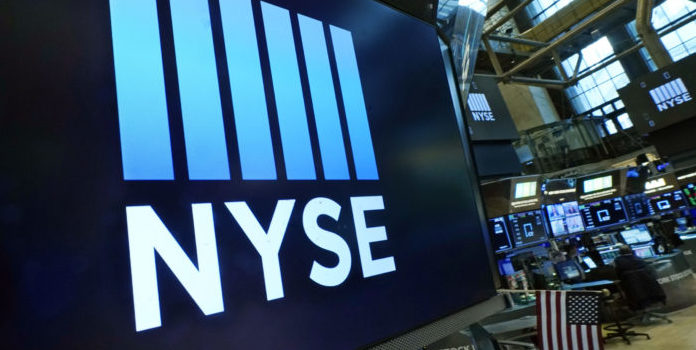(Headline USA) Nearly everything on Wall Street is tumbling Monday as fear about a slowing U.S. economy worsens and sets off another sell-off for financial markets worldwide.
The S&P 500 was down by 3.1% in morning trading, coming off its worst week in more than three months. The Dow Jones Industrial Average was down 956 points, or 2.4%, as of 10:10 a.m. Eastern time, and the Nasdaq composite slid 4%.
The drops were just the latest in a sell-off that swept the Earth. Japan’s Nikkei 225 helped start Monday by plunging 12.4% for its worst day since the Black Monday crash of 1987.
It was the first chance for traders in Tokyo to react to Friday’s report showing U.S. employers slowed their hiring last month by much more than economists expected. That was the latest piece of data on the U.S. economy to come in weaker than expected, and it’s all raised fear the Federal Reserve has pressed the brakes on the U.S. economy by too much for too long through high interest rates in hopes of stifling inflation.
President Joe Biden’s top economic advisor, Gene Sperling, announced his separation from the White House during the aftermath of the economic losses but said he would be working on the campaign of Vice President Kamala Harris instead.
Losses elsewhere in the world were nearly as neck-snapping. South Korea’s Kospi index careened 8.8% lower, stock markets across Europe sank more than 2% and bitcoin dropped 9.5%.
Even gold, which has a reputation for offering safety during tumultuous times, slipped 1.4%.
That’s in part because traders are wondering if the damage has been so severe that the Federal Reserve will have to cut interest rates in an emergency meeting, before its next scheduled decision on Sept. 18. The yield on the two-year Treasury, which closely tracks expectations for the Fed, fell to 3.81% from 3.88% late Friday and from 5% in April.
“The Fed could ride in on a white horse to save the day with a big rate cut, but the case for an inter-meeting cut seems flimsy,” said Brian Jacobsen, chief economist at Annex Wealth Management. “Those are usually reserved for emergencies, like COVID, and an unemployment rate of 4.3% doesn’t really seem like an emergency.”
“The Fed could respond by stopping” the shrinking of its holdings of Treasurys and other bonds, he said. “That could at least by a symbolic action that they’re not blind to what’s going on.”
After leaving the federal funds rate steady last week, before several discouraging economic reports hit, Fed Chair Jerome Powell said officials “have a lot of room to respond if we were to see weakness” in the job market after raising their main rate to the highest level in more than two decades.
Goldman Sachs economist David Mericle sees a higher chance of a recession following Friday’s jobs report. He sees only a 25% probability of that, up from 15%.
Some of Wall Street’s recent declines may simply be air coming out of a stock market that romped to dozens of all-time highs this year, in part on a frenzy around artificial-intelligence technology and hopes for coming cuts to interest rates. Critics have been saying for a while that the stock market looked expensive after prices rose faster than corporate profits.
U.S. stocks pared their losses a bit Monday morning after a report said growth for U.S. services businesses was a touch stronger than expected. Growth was led by businesses in the arts, entertainment and recreation businesses, along with accommodations and food services, according to the Institute for Supply Management.
Still, stocks of companies whose profits are most closely tied to the economy’s strength took heavy losses on the fears about a slowdown. The small companies in the Russell 2000 index dropped 4.4%, further dousing what had been a revival for it and other beaten-down areas of the market.
Making things worse for Wall Street, Big Tech stocks also tumbled sharply as the market’s most popular trade for much of this year continued to unravel. Apple, Nvidia and a handful of other Big Tech stocks known as the “Magnificent Seven” had propelled the S&P 500 to records this year, even as high interest rates weighed down much of the rest of the stock market.
But Big Tech’s momentum turned last month on worries investors had taken their prices too high and expectations for future growth are becoming too difficult to meet. A set of underwhelming profit reports that began with updates from Tesla and Alphabet added to the pessimism and accelerated the declines.
Apple fell 5% Monday after Warren Buffett’s Berkshire Hathaway disclosed that it had slashed its ownership stake in the iPhone maker.
Nvidia, the chip company that’s become the poster child of Wall Street’s AI bonanza, fell even more, 9.1%. Analysts cut their profit forecasts over the weekend for the company after a report from The Information said Nvidia’s new AI chip is delayed. It has trimmed its gain for the year to 97% from 170% in the middle of June.
Because the Magnificent Seven companies have grown to be the market’s biggest by market value, the movements for their stocks carry much more weight on the S&P 500 and other indexes.
Worries outside corporate profits, interest rates and the economy are also weighing on the market. The Israel-Hamas war may be worsening, which beyond its human toll could also cause sharp swings for the price of oil. That’s adding to broader worries about potential hotspots around the world, while upcoming U.S. elections could further scramble things.
Wall Street has been concerned about how policies coming out of November could impact markets, but the sharp swings for stock prices could also affect the 2024 election itself.
Adapted from reporting by the Associated Press

